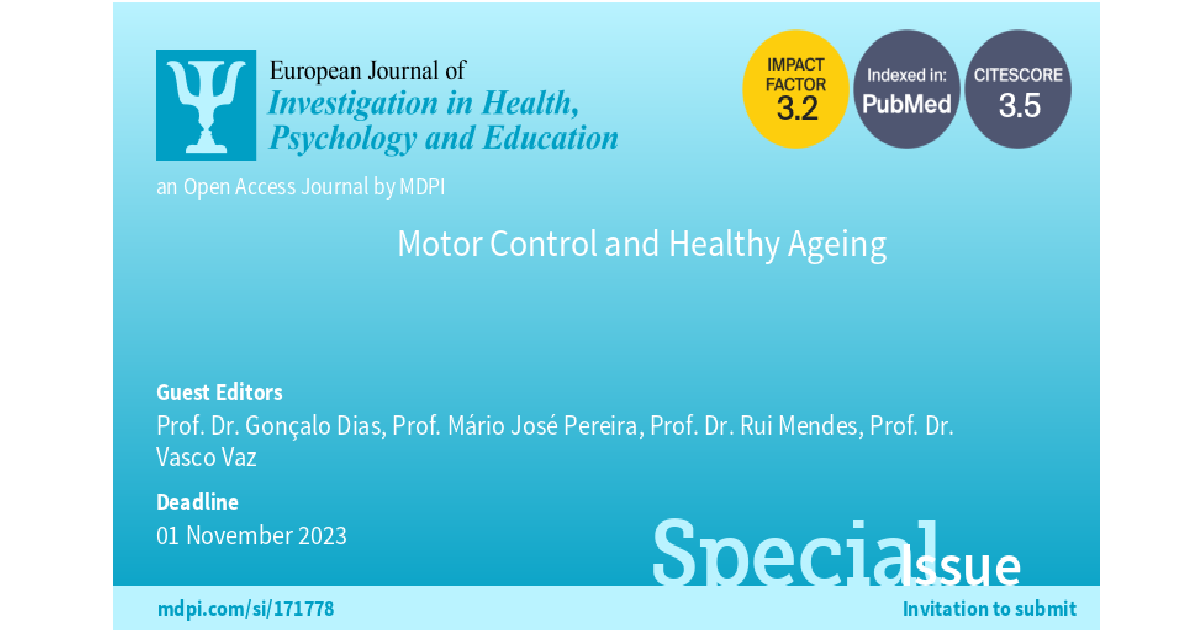- 2.6Impact Factor
- 5.1CiteScore
- 30 daysTime to First Decision
Motor Control and Healthy Ageing
Special Issue Information
Dear Colleagues,
Populations over the age of 55 are increasing, and by 2050, 22% of the world's population will be classed as elderly. Comprehensive knowledge of this stage of life must expand to meet the growth of this specific population. Relevant research will develop and introduce advances in sports science through studies involving motor control and the elderly, meeting the demand that science faces from an economic perspective and in relation to the health and well-being of the population (Pereira et al., 2022).
The aim of this Special Issue is to explore the relationship between motor control and a life span approach to healthy ageing. Potential topics include (but are not limited to):
- Healthy ageing;
- Active ageing;
- Exercise and ageing;
- Physical fitness and elderly;
- Learning motor skills and ageing;
- Motor control in the elderly;
- Quality of life through exercise and physical fitness;
- Exercise and cognition in the elderly.
Prof. Dr. Gonçalo Dias
Prof. Mário José Pereira
Prof. Dr. Rui Mendes
Prof. Dr. Vasco Vaz
Guest Editors
Manuscript Submission Information
Manuscripts should be submitted online at www.mdpi.com by registering and logging in to this website. Once you are registered, click here to go to the submission form. Manuscripts can be submitted until the deadline. All submissions that pass pre-check are peer-reviewed. Accepted papers will be published continuously in the journal (as soon as accepted) and will be listed together on the special issue website. Research articles, review articles as well as short communications are invited. For planned papers, a title and short abstract (about 250 words) can be sent to the Editorial Office for assessment.
Submitted manuscripts should not have been published previously, nor be under consideration for publication elsewhere (except conference proceedings papers). All manuscripts are thoroughly refereed through a single-blind peer-review process. A guide for authors and other relevant information for submission of manuscripts is available on the Instructions for Authors page. European Journal of Investigation in Health, Psychology and Education is an international peer-reviewed open access monthly journal published by MDPI.
Please visit the Instructions for Authors page before submitting a manuscript. The Article Processing Charge (APC) for publication in this open access journal is 1600 CHF (Swiss Francs). Submitted papers should be well formatted and use good English. Authors may use MDPI's English editing service prior to publication or during author revisions.
Keywords
- motor behaviour
- motor development
- motor control
- motor learning
- elderly
- ageing
- healthy ageing

Benefits of Publishing in a Special Issue
- Ease of navigation: Grouping papers by topic helps scholars navigate broad scope journals more efficiently.
- Greater discoverability: Special Issues support the reach and impact of scientific research. Articles in Special Issues are more discoverable and cited more frequently.
- Expansion of research network: Special Issues facilitate connections among authors, fostering scientific collaborations.
- External promotion: Articles in Special Issues are often promoted through the journal's social media, increasing their visibility.
- e-Book format: Special Issues with more than 10 articles can be published as dedicated e-books, ensuring wide and rapid dissemination.

